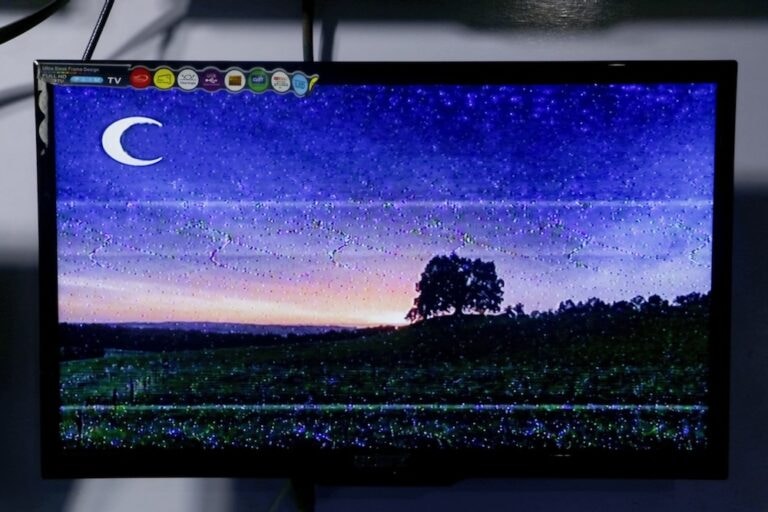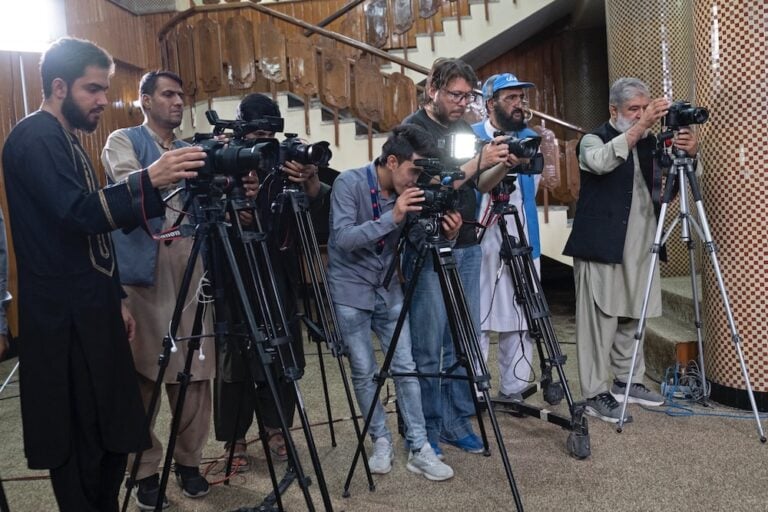(RSF/IFEX) – The following is a 3 November 2001 RSF press release: Michel Peyrard released but Irfan Qureshi and Mukkaram Khan remain detained Reporters sans frontières welcomes the release of Michel Peyrard, reporter from the French weekly Paris Match. “We are very pleased by this release but remain very concerned about the two Pakistani journalists, […]
(RSF/IFEX) – The following is a 3 November 2001 RSF press release:
Michel Peyrard released but Irfan Qureshi and Mukkaram Khan remain detained
Reporters sans frontières welcomes the release of Michel Peyrard, reporter from the French weekly Paris Match. “We are very pleased by this release but remain very concerned about the two Pakistani journalists, Irfan Qureshi and Mukkaram Khan, who remain detained in Jalalabad,” said Robert Ménard, the organisation’s secretary-general. “We will continue to do everything possible to secure their release,” he added. The two journalists were arrested at the same time as the French journalist, on 9 October.
Reporters sans frontières recalls that British journalist Yvonne Ridley’s two guards and one of the guards’ daughters are still detained by the Taliban, as is Japanese journalist Yanagida Daigen, who was arrested on 23 October 2001.
On 3 November 2001, Michel Peyrard was released after spending over three weeks in detention. “I am doing well. The Taliban behaved properly,” he told Agence France Presse. According to a Taliban spokesman who escorted Michel Peyrard to the Pakistani border, Irfan Qureshi and Mukkaram Khan would possibly be released on Sunday 4 November. The French ambassador to Pakistan, Yannick Gérard, Pakistani officials and Reporters sans frontières’ correspondent were at the Torkham border crossing, in Pakistan, to meet the French reporter. Earlier that day, Mollah Abdul Salam Zaef, the Taliban’s ambassador in Islamabad, announced the Paris Match journalist’s release to the Afghan Islamic Press Agency. On the afternoon of 3 November, after meeting with Mollah Zaef, the French ambassador to Pakistan left Islamabad for the Afghan border.
A few days earlier, Reporters sans frontières and Paris Match management had expressed confidence that Michel Peyrard and the two Pakistani journalists would be released shortly. On 29 October 2001, Mollah Zaef received one of the detained Pakistani journalists’ family members and told him that he would soon likely be able to give him some “good news.” In addition, RSF learned that the Taliban secret service authorised the Paris Match journalist and his two colleagues to walk freely in the streets of Jalalabad for a few hours. They reportedly visited the city’s bazaar. Reached by telephone from Pakistan, they confirmed that they were well-treated and expressed optimism that they would be released.
Michel Peyrard, a reporter from the French weekly Paris Match, and his two guides, Mukkaram Khan, a correspondent from the Pakistani newspaper Nawa-i-Waqt, and Irfan Qureshi were arrested on the morning of 9 October 2001, in Goshta, on the road that goes from the Pakistani border to Jalalabad (in eastern Afghanistan). The day after their arrest, the Taliban authorities announced that they were accused of espionage and would be tried by an Islamic court. The accusations were based on the seizure of satellite telephones and other materials used by reporters in conflict zones. A witness to Michel Peyrard’s arrest confirmed that it took place just as the Paris Match reporter had crossed the Kabul river. Disguised as a woman, his height, unfeminine walk and shoes had raised suspicion. The three men were reportedly beaten by inhabitants of the tribal zone where they were arrested.
On 25 October 2001, the Taliban announced that the investigation of the three journalists was completed. The three journalists were to be tried before an Islamic court. They faced the death penalty if found guilty on espionage charges. Michel Peyrard’s release was finally ordered by Mollah Mohammad Omar “further to repeated requests by the French authorities and his family,” explained Mullah Tajmir, the head of the Taliban’s intelligence services in Jalalabad.
On 27 October, the Taliban reiterated that any foreigner entering Afghanistan without authorisation would be treated as a spy and tried as such. They repeated the warning to foreign journalists on 3 November 2001.


